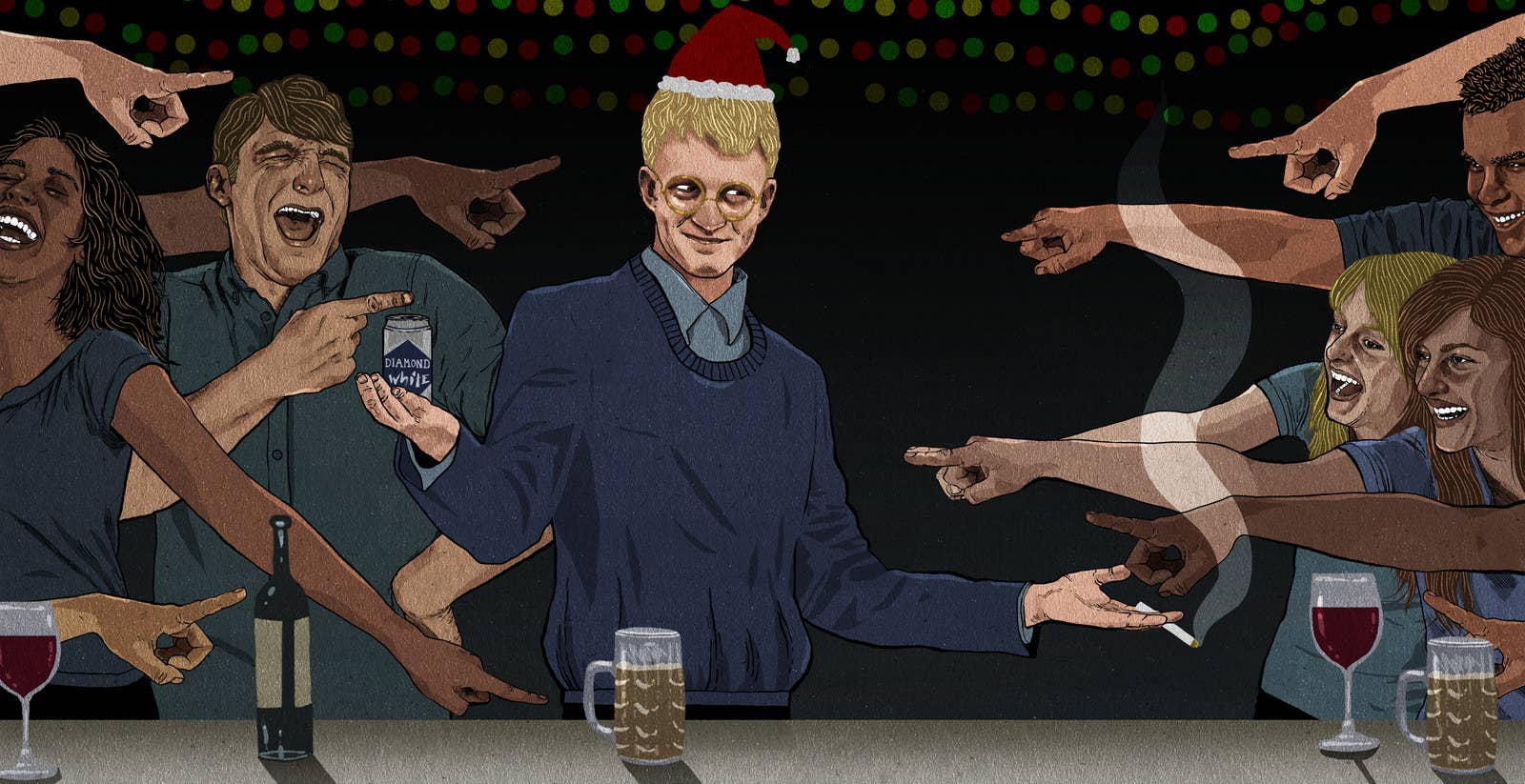
It was at the Christmas party in my first year at sixth-form college that everything changed. The other kids were standing around in Kangol caps, baggy jeans, and Palladium shoes – it was the early '90s – as the KLF blasted from the soundsystem. But no one was listening to the music. For the first time in my life they were listening to me.
Leaning against the bar, a pint of Diamond White cider in one hand and a Silk Cut in the other, I was regaling my new friends with some funny story or other. I can't remember what; what matters is that I was the butt of my own joke. All around me people listened intently, their eyes wide, their smiles wider. I delivered the punchline and they roared with laughter. I felt a rush of joy stronger than anything I'd ever experienced. This is it, I thought, now you've got them.
In that instant I understood that this was how I could become popular: by drinking, smoking, and, most importantly, by making fun of myself. There was a way to make people like me, and it meant becoming a performing seal.
I was desperate to reinvent myself. I needed to discard the person I had been. For more than 10 years at school I was subjected to horrific bullying for being gay. This was not merely name-calling or being excluded by the other pupils. This was hearing their disgust directed at me several times a day, physically as well as verbally. This meant not being able to walk down a corridor without hearing the kids lined up on each side spitting their insults at me or shoving me away. This meant eating my lunch in a toilet cubicle every day – I was too frightened to show my face in the playground. It meant sitting on the school bus home desperately trying not to cry while the entire bus pointed at me and chanted a single word filled with hate: queer.
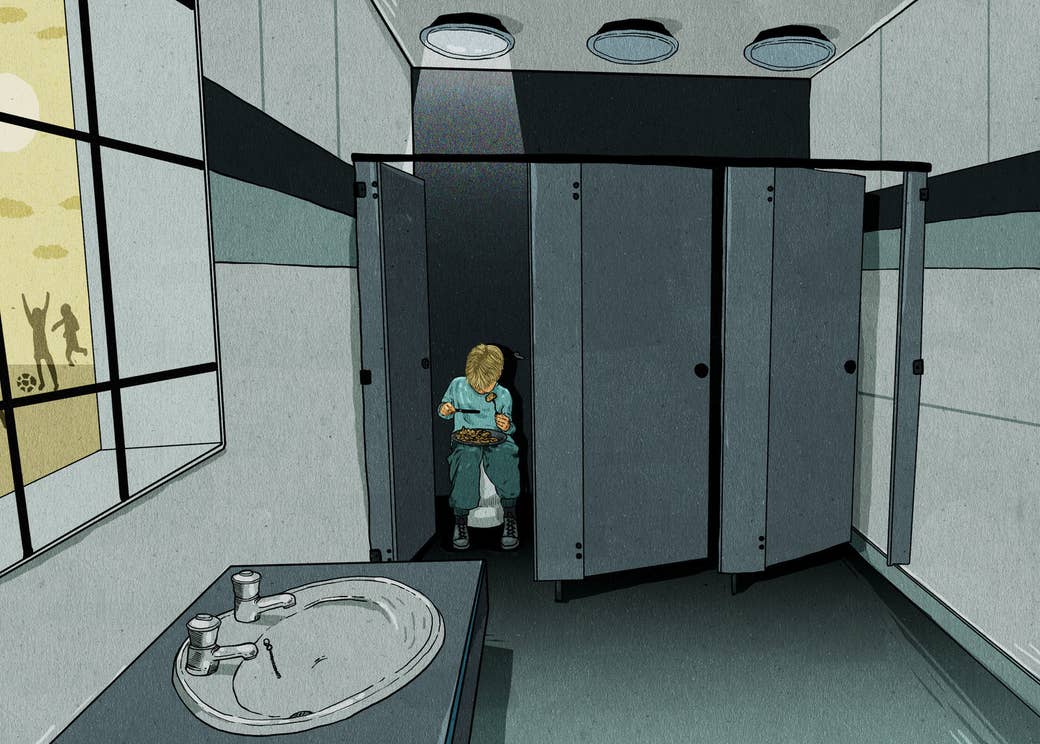
It started almost as far back as I can remember. Before I knew I was gay they said I was queer because I was effeminate, because I hated team sports, and because I liked playing with the girls.
Perhaps worst of all, in the northern, working-class towns where I grew up – Bolton, Bury, and Manchester – adults and even teachers thought it was OK to ignore the bullying, or, sometimes, to join in. There was no one I could talk to. The experience left me feeling brutalised. I hated myself almost as much as everyone else did.
So when, around the age of 16, I began drinking and suddenly people started to like me, I felt overwhelmed, as if someone had flicked a switch and my camp voice was suddenly considered acceptable, even celebrated. I didn't stop to think that maybe my peers were starting to mature and society was becoming a little less homophobic. All I noticed was that alcohol made me loud, bold, and confident, that the new me was welcomed into the party, no longer excluded. I did not realise the dangerous associations that were being established in my mind. I did not know that this wasn't the answer but something that would make everything a lot worse.
Within a few months the performing-seal act was complete. I was ready to do anything to get the party going and the first person everyone wanted at any drink-fuelled celebration. I went from being the most unpopular person in school to the most popular person at sixth-form college, and, later, university.
When I officially came out of the closet at 17 and began sleeping with men, I realised I could crank this performance up a notch by treating everyone to stories drawn from my growing repertoire of outrageous one-night stands. "So who've you shagged lately?" people would ask the moment I walked into a room, their faces aglow with expectation.
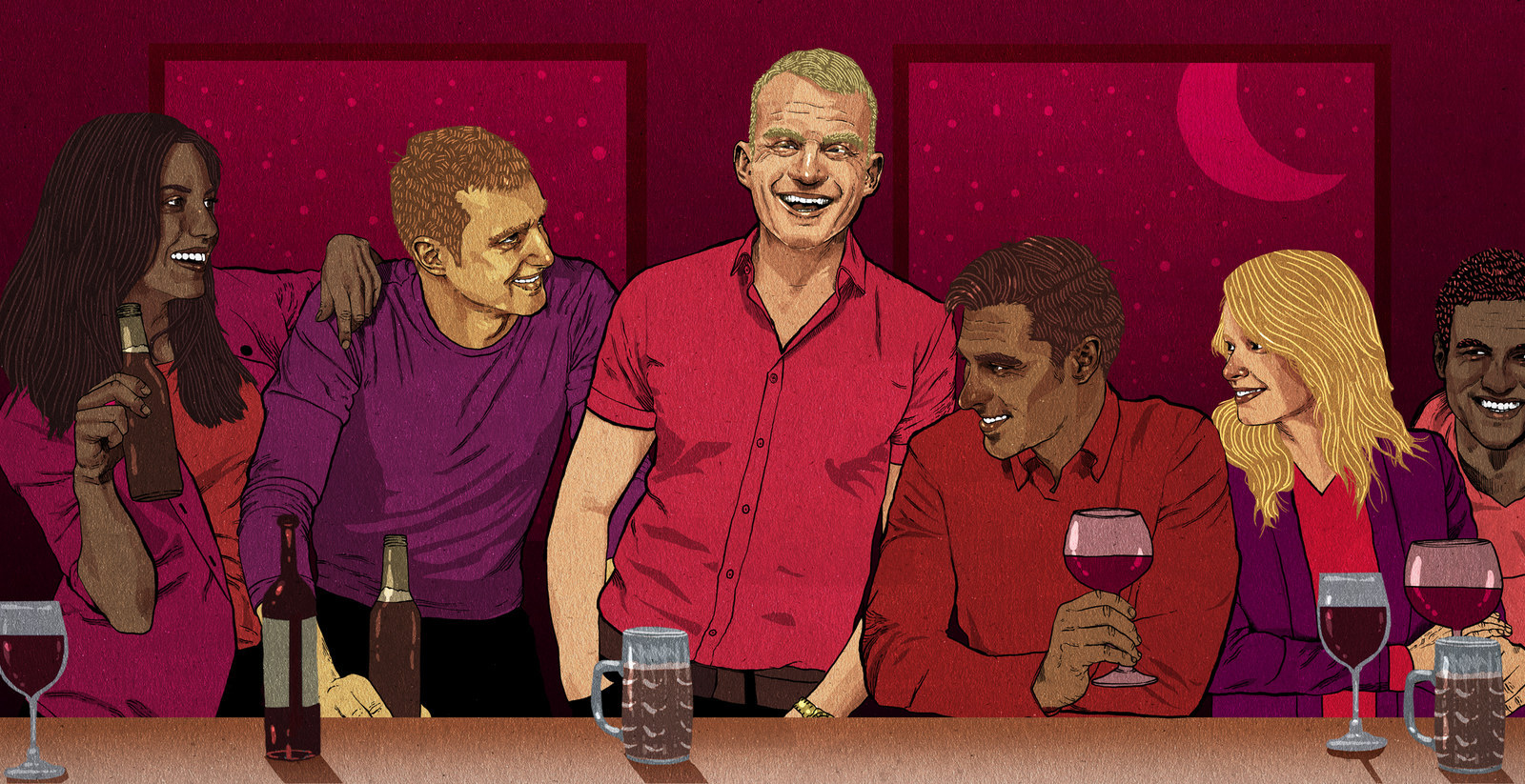
Yes, I was having fun – of sorts – but it continued right through my twenties, and as I approached 30 my life was revolving around an endless cycle of drinking, casual sex, and unhealthy relationships with unsuitable men. I was constantly having to up the ante by getting drunker and dirtier just to maintain the momentum. On more than one occasion I found myself going home with a man with an unusual profession just because I thought it would make a good anecdote. My debts were spiralling out of control. I was robbed several times by men I'd taken home and my health began to suffer. The risks I'd taken sexually meant I had to undergo several HIV tests, although luckily they came back negative.
I was desperately unhappy and heading towards rock bottom. I vomited on a plane. I woke up in a hotel room in Beijing with a man I could not remember meeting. I collapsed at work.
But I could not see how to break out of the behavioural patterns I'd so willingly jumped into. Being an entertaining drunk had become part of my identity. It was what people wanted of me.
Just after I turned 30, however, a survival instinct kicked in. I knew that if I did not change I would end up killing myself. I decided to give up alcohol.
In the end it wasn't hard – I was sick of it. But it meant overcoming an ingrained fear, that the popularity I'd built up would be demolished, that I needed drink to be liked, that without booze I would be alone again.
That was not what happened. I lost the odd drinking partner, but most friends stuck by me. Many said they liked me more. I quickly began to feel more balanced. The highs from a wild night out went, but thankfully, the crashing lows did, too.
I started seeing a psychotherapist once a week and he taught me that the way I drank was a form of self-harm: I was trying to annihilate my real self because there was something about that person that I still hated. Through the work we did together, I began to realise that even though I'd come to feel happy being gay, having grown up in a world where I was constantly told that my sexuality was disgusting and therefore I was disgusting had cast a long shadow of self-loathing.
You don't have to look far among gay men, particularly those brought up before attitudes began to change, to see this self-destructive pattern repeated and repeated.
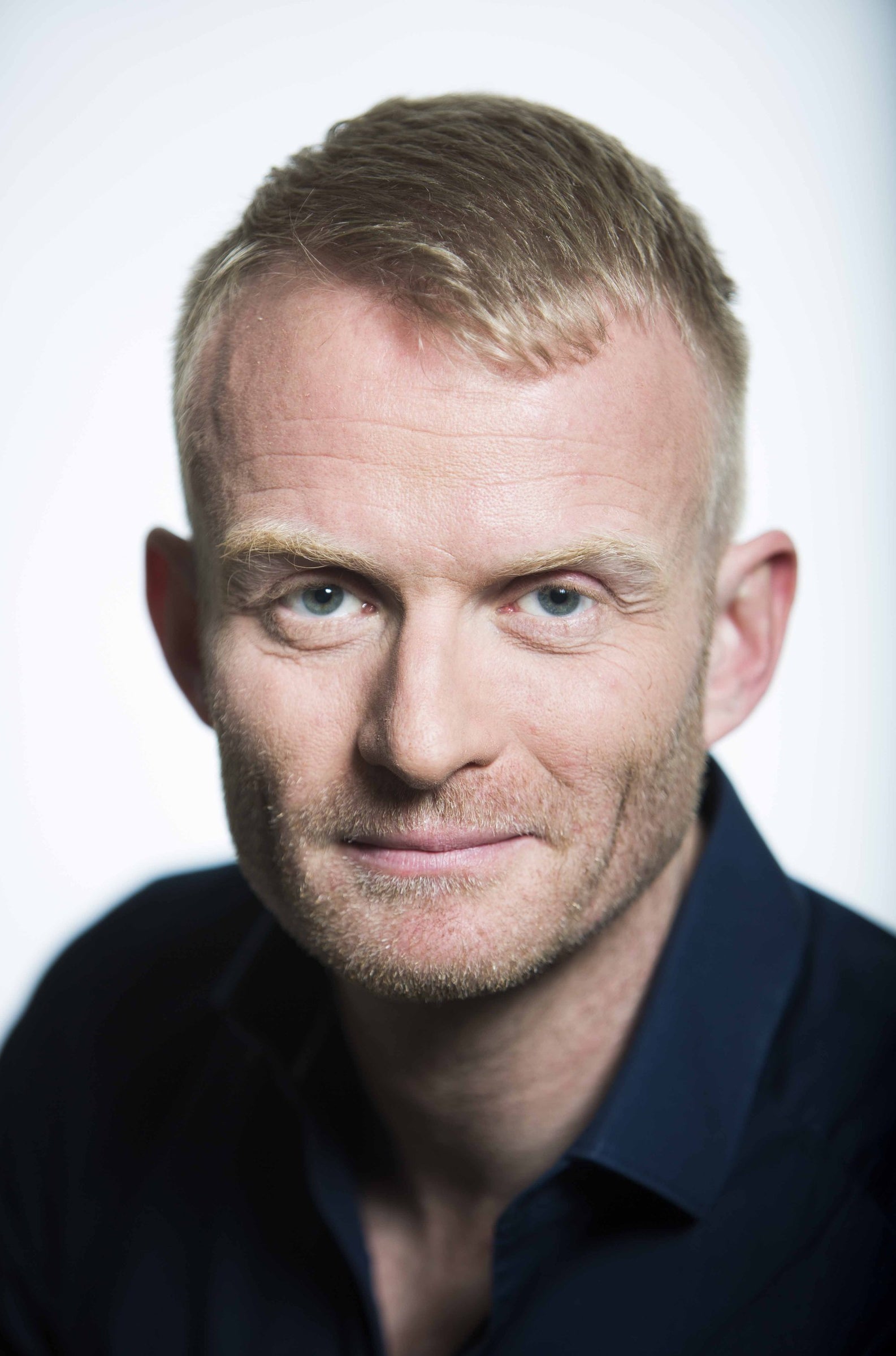
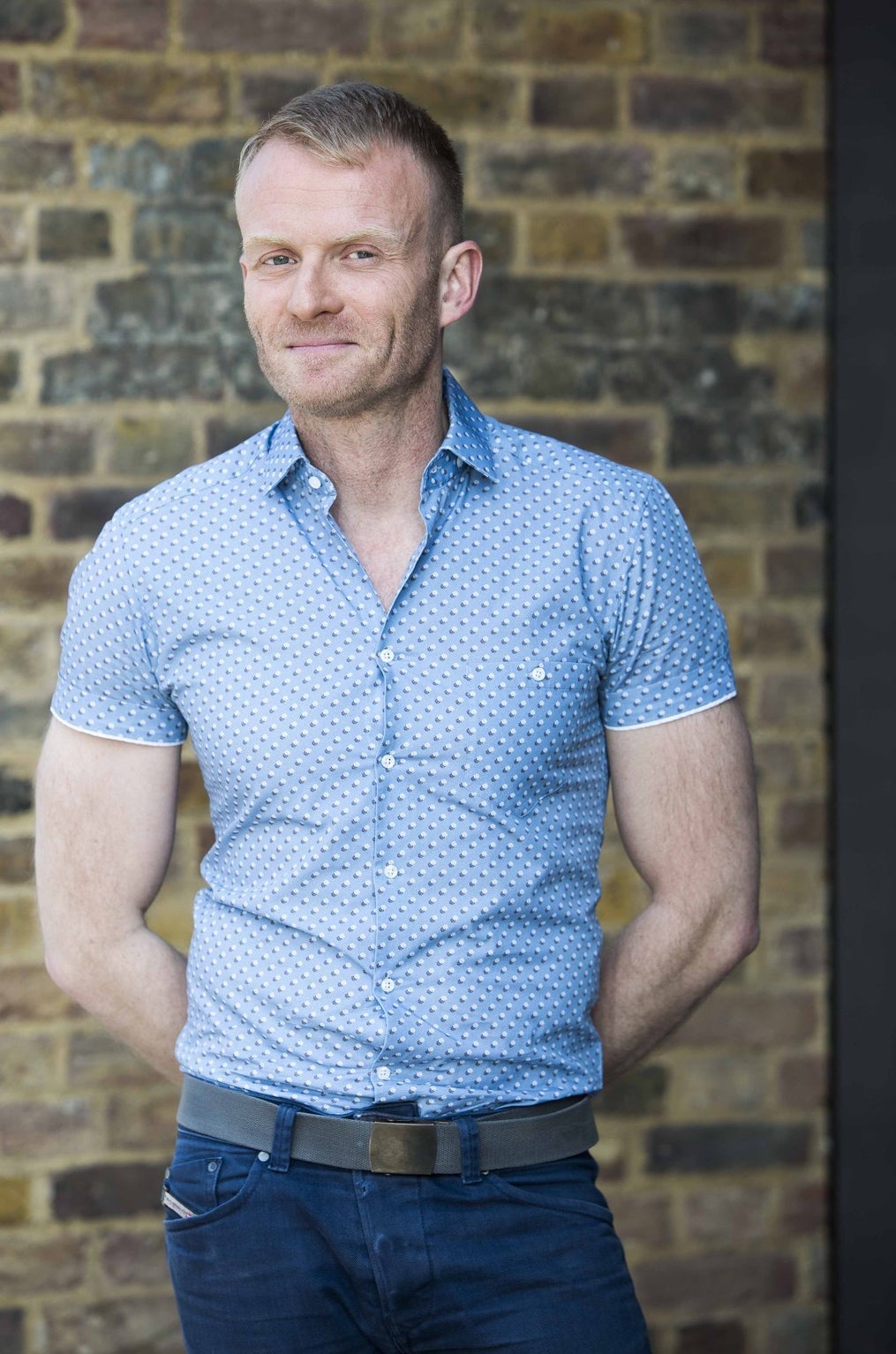

Matt Cain
But you also, of course, don't have to be gay to press the self-destruct button. The more I've talked to others about my experiences of self-loathing, the more others have revealed theirs to me – particularly women. My own story of self-harm, and those of so many I have known over the years, became the inspiration for my novel Nothing But Trouble. The title has personal resonance – it was what people used to say about me. The book, a comedy thriller, focuses on a group of characters each convinced they're not good enough. The low self-worth leads them to take it out on themselves or the people around them, through drug abuse, drinking to oblivion, or sleeping with bad men. It's a story I know too well.
But self-sabotage, for me, is finally over. A couple of years ago, after five years being sober, I started drinking again. It wasn't that I missed it particularly, rather that it can make social events easier – in moderation. I wanted to see if now, after therapy, after learning not to hate and destroy myself, I could do it.
So I started drinking very slowly and carefully, and only surrounding myself with people who wouldn't tip me over the edge. I wrote myself a set of rules, the foremost of which is never to drink when unhappy. Also, to not sacrifice my dignity for the sake of entertaining others. And to ensure I go home before I'm tempted to jump into bed with an unsuitable man.
I've had the occasional mishap. But on the whole, armed with more self-awareness and a desire to take care of myself, I'm doing well. The angry edge that used to accompany my nights out is gone. The objective, to punish myself, has disappeared.
I like to think I can still make people laugh with my repertoire of filthy stories. But I don't need to keep finding new ones, I don't need to be drunk to tell them, and now, at last, I've found a new outlet: I can channel all the stories I need to tell into my novels.
Nothing But Trouble is out now, published by Pan Macmillan. For more information visit mattcainwriter.com.
